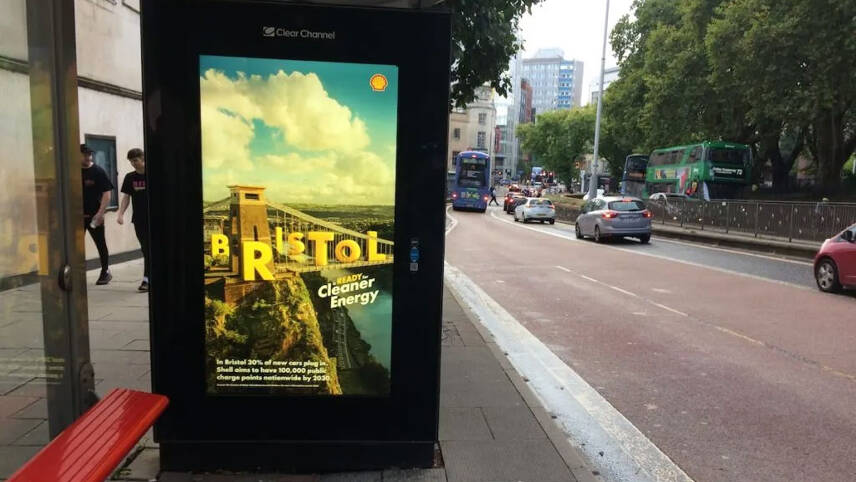Register for free and continue reading
Join our growing army of changemakers and get unlimited access to our premium content

Image: AdFree Cities
The Advertising Standards Agency (ASA) has today (7 June) ruled that Shell will need to pull the advertisements, as they may lead viewers to overestimate its investment in clean energy.
First published in 2022, the campaign consists of a video advertisement and a billboard, both showing imagery of electric vehicle charging infrastructure and of wind turbines. The campaign used the tagline “the UK is ready for cleaner energy”.
Also linked to this campaign was a local variation in the south west of England, with taglines such as “Bristol is ready for cleaner energy”.
Campaign group AdFree Cities urged the ASA to ban the adverts on the grounds that they would mislead viewers into believing that Shell is a sustainable company.
The ASA agreed, ruling that the adverts misled by giving the overall impression that low-carbon energy comprised “a significant proportion of the energy products Shell invested in and sold in the UK in 2022, or were likely to do so in the near future”.
It is estimated that Shell allocated just 1% of its investments in the year leading up to the advertising campaign to renewable energy and electric vehicles in the UK.
“Fossil fuel firms and other businesses are increasingly using advertising campaigns to highlight the greener – but proportionally smaller – elements of their operations, while omitting or downplaying their environmentally damaging activities such as large-scale fossil fuel extraction,” said AdFree Cities in a statement.
The organisation hopes that the ASA’s ruling will deter other energy majors from greenwashing in their adverts but, further to that, it is campaigning for an outright ban on public advertisements from fossil fuel firms “owing to their historic and ongoing role in wrecking the planet”.
The ASA’s ruling noted that consumers were “increasingly concerned about the environmental impact of activities related to higher-carbon products and services”.
edie has reached out to Shell for a comment. Documents from the ASA note that Shell believed that customers would be familiar with its oil and gas work but less with its energy transition activity, and backed this claim up with its own market research. Shell also noted its own commitment to net-zero by 2050.
Shell has been rapped for greenwashing in the past. In 2021, the Netherlands’ advertising watchdog urged Shell to stop running a campaign promoting fuel purchases as ‘carbon neutral’, providing that customers purchase offsets. The EU is now mulling an outright ban on claims of carbon neutrality in advertisements or on products.
Repsol and Petronas
The ASA has also, today, upheld complaints about advertisements from Malaysian multinational energy major Petronas and Spanish energy and petrochemicals firm Repsol.
The ASA itself challenged a TV ad from Petronas, first broadcast in September 2022. The advert described the firm as a “progressive energy and solutions partner, enriching lives for a sustainable future”. It included a 2050 net-zero commitment and imagery of solar panels and a recycling facility.
According to the ASA, this advert was likely to give viewers the impression that Petronas was already a sustainable company. This is despite the fact that it is a major source of greenhouse gas emissions. The ASA ruled that the advert was misleading in that it omitted important environmental information.
As for Repsol, a complaint was raised by AdFree cities over an advertisement in online news outlets, first seen in February this year. The advert hyped up Repsol’s development of biofuels and synthetic fuels, showing a petrol pump with a leaf within it.
The advert linked through to Repsol’s general news and information site, rather than to further information on its work in the alternative fuels space. Repsol said the intended audience of Financial Times readers would already be educated and informed, and thus able to locate the further information. Nonetheless, it pledged to remove the advert of its own accord.
The ASA ruled that the advert would lead viewers to believe that biofuels and synthetic fuels were a larger part of Repsol’s business than they actually are.


Please login or Register to leave a comment.